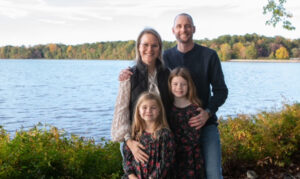For high school students interested in agriculture, food and environmental sciences, the University of Georgia offers the opportunity to have hands-on learning with world-renowned research scientists through the Young Scholars Program (YSP). YSP is a six-week long paid summer internship organized by the UGA College of Agricultural and Environmental Sciences which hopes to broaden students interests in various fields of study. Students can apply to be part of the program at three UGA campuses: Athens, Griffin and Tifton.
While in the program, students are assigned to work with a researcher and their staff on campus. They learn about the research that is ongoing in that department, how to use lab equipment and work in the field, as well as completing their own research project under the guidance of their mentor. On the UGA Griffin Campus, students spend Fridays with fellow young scholars where they attend site visits of many departments, participate in college and career related workshops and play interactive games to give them a chance to know each other.
This year, UGA Griffin selected 20 students to participate in the program which ran June 6 – July 15 on the Griffin Campus. Five students in the program were from Fayette County: Maribelle Foppe (Starr’s Mill High School), Shivani Pemaraj (McIntosh High School), Alysha Rawji (Starr’s Mill High School), Richard Wang (Starr’s Mill High School) and Caspian Watkins (Sandy Creek High School).
Maribelle Foppe worked in the department of Crop and Soil Sciences with Paul Raymer and his research team, where she conducted research on the effects of herbicide Fusilade II on the turfgrass, seashore paspalum, to create a herbicide resistant strain. This is a desirable trait in the turfgrass breeding to help the seashore paspalum compete with invasive species. Foppe stated the research was one of her favorite parts of the program.
“I enjoyed the exposure to the research realm,” said Foppe. “It gave me the opportunity to really understand the scientific process in a professional setting.”
Foppe, who is now a junior at Starr’s Mill High School, wants to pursue a career that will allow her to work abroad in a humanitarian setting.
Shivani Pemaraj spent the summer working in plant pathology where she studied which fungicides were the most effective in inhibiting the growth of fungus – specifically dollar spot and large patch – in turfgrass. For her, the best part of YSP was making new friends.
“My favorite part was definitely meeting all kinds of new people,” said Pemaraj. “Everyone was so sweet and helpful. My advice to future Young Scholars would be to try your best to network and make the best of a great opportunity.”
Pemaraj, who is now a senior at McIntosh High School, plans to attend UGA and major in environmental engineering.
Alysha Rawji worked in horticulture with Bodie Pennisi and her research team during the summer. Her research centered on determining if a new cultivar of Aronia arbutifolia- commonly known as red chokeberry -would be viable in Georgia by testing the ploidy levels. Rawji’s project was part of a larger project being conducted by Dr. Pennisi and she stated she loved being able to do hands-on research while using the lab equipment.
“My favorite part was working in the tissue culture lab with the flow cytometer,” said Rawji.
Rawji is now a junior at Starr’s Mill High School and wants to attend either UGA or Georgia Tech to study the field of astrophysics.
Richard Wang worked in the department of Crop and Soil Sciences under the direction of professor Jack Huang and his research team. Through his research, Wang compared titanium suboxides in electrochemical oxidation of perfluorooctane sulfonic acids (PFOS). PFOS are a type of perfluoroalkyl substances (PFAS) which are persistent organic pollutants that were originally developed for usage in non-stick sprays, fabrics, and food packaging. When they are absorbed into the body, they can cause cancer, liver damage, and birth defects. Wang’s project focused on electrochemical oxidation to degrade the PFOS.
“My favorite part of YSP was learning how research at university works,” said Wang. “And my advice to future Young Scholars would be to keep asking questions and learn as much as you can from your mentors.”
Wang is now a senior at Starr’s Mill High School and aspires to attend Georgia Tech to pursue a degree in engineering.
Caspian Watkins is the final YSP intern from Fayette County. He spent the summer working in plant pathology where he studied the growth of different fungi on different media to help dilute the loss of switchgrass biomass, which can be formed into biofuel.
Watkins noted his favorite part of the summer was conducting research and learning about the uses of switchgrass, such as for biofuel. When asked if he had any advice to pass along to future Young Scholars, he simply stated they should “take notes.”
Watkins is now a senior at Sandy Creek High School. He aspires to attend the Naval Academy and one day become a pilot.
YSP concludes each year with a three-day collegiate conference at the University of Georgia campus in Athens. Students had the chance to interact with other YSP students from the Athens and Tifton campuses, learn about the UGA admissions process and explore the campus.
Students interested in participating in YSP next year must be 16 years old and have completed their sophomore year of high school by the program start date. Applications are open for submission beginning on November 1, 2022 and must be completed by January 31, 2023. Further information about the application process can be found online by visiting ysp.caes.uga.edu.
By Ashley Biles
UGA Griffin













Leave a Comment
You must be logged in to post a comment.